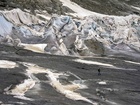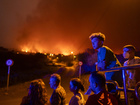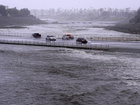The Swiss weather service said Monday a heat wave has driven the zero-degree Celsius level to its highest altitude since recordings on it in Switzerland began nearly 70 years ago, an ominous new sign for the country's vaunted glaciers.
MeteoSwiss says the zero-degree isotherm level reached 5,298 meters (17,381 feet) above sea level over Switzerland overnight Sunday to Monday. All of Switzerland's snow-capped Alpine peaks — the highest being the 4,634-meter (15,203-foot) Monte Rosa summit — had air temperatures over zero Celsius (32 F) where water freezes to ice, raising prospects of a thaw.
 Full Story
Full Story
Hundreds of firefighters struggled Tuesday to control major wildfires burning out of control for days in northeastern Greece and on Tenerife in Spain's Canary Islands, with strong winds fanning the flames and prompting evacuations of villages and a city hospital in Greece.
Hot, dry and windy conditions have seen dozens of wildfires break out across Greece, with the most severe entering its fourth day and encroaching on the northeastern port city of Alexandroupolis. On Monday, two people died and two firefighters were injured in separate fires in northern and central Greece.
 Full Story
Full Story
Major wildfires were burning in Greece and on one of Spain's Canary Islands off the northwest coast of Africa Monday, with hot, dry and windy conditions hampering the efforts of hundreds of firefighters battling the blazes, two of which have been burning for several days.
European Union officials have blamed climate change for the increasing frequency and intensity of wildfires in Europe, noting that 2022 was the second-worst year for wildfire damage on record after 2017.
 Full Story
Full Story
Tropical Storm Hilary inundated streets across Mexico's arid Baja California Peninsula with deadly floodwaters Sunday before moving over Southern California, where it swamped roads and downed trees, as concerns mounted that flash floods could strike in places as far north as Idaho.
Forecasters said Hilary was the first tropical storm to hit Southern California in 84 years, bringing floods, mudslides, high winds, power outages and the potential for isolated tornadoes. The storm already dumped more than 6 inches (15.24 centimeters) of rain in some mountain communities and threatened more than an average year's worth of rain in inland desert areas.
 Full Story
Full Story
A new study reveals that 25 countries, home to a quarter of the world's population, are facing extremely high water stress. Most are located in the Middle East, South Asia and Africa.
Repeated droughts around the world are depleting water tables and leading to water stress, in other words, demand for water is outstripping available resources. And the situation is not about to improve. By 2050, almost 60% of the world's population could be facing extremely high water stress for at least one month of the year. Such are the alarming findings of the World Resources Institute (WRI), which recently published data from its Aqueduct Water Risk Atlas, detailing the countries most at risk of water shortages. It names the five most water-stressed countries as Bahrain, Cyprus, Kuwait, Lebanon and Oman. "The water stress in these countries is mostly driven by low supply, paired with demand from domestic, agricultural and industrial use," the WRI notes.
 Full Story
Full Story
Hurricane Hilary strengthened into a major storm Thursday evening off Mexico's Pacific coast, and it could bring heavy rain to the southwestern U.S. by the weekend.
The U.S. National Hurricane Center said Hilary's maximum sustained winds had risen to 120 mph (195 kph), making it a Category 3 hurricane.
 Full Story
Full Story
Outdoor alert sirens on Maui stayed silent as a ferocious fire devastated the seaside community of Lahaina last week. The head of the Maui Emergency Management Agency said he had no regrets about not deploying the system as a warning to people on the island.
A day after making that statement, Administrator Herman Andaya resigned Thursday. Andaya had said he feared blaring the sirens during the blaze could have caused people to go "mauka," using a navigational term that can mean toward the mountains or inland in Hawaiian.
 Full Story
Full Story
Firefighters battled overnight to try to bring under control the worst wildfire in decades on the Spanish Canary Island of Tenerife, a major tourist destination, officials said Friday.
The fire in the north of the island, which started late Tuesday, has forced the evacuation or confinement of nearly 8,000 people in eight municipalities.
 Full Story
Full Story
Thousands of residents fled the capital of Canada's Northwest Territories ahead of an approaching wildfire Thursday, some driving hundreds of miles to safety and others waiting in long lines for emergency flights, the latest chapter in Canada's worst fire season on record.
The fire, boosted by strong winds, was within 16 kilometers (10 miles) of Yellowknife's northern edge, and people in the four areas at highest risk were told to leave as soon as possible, Fire Information Officer Mike Westwick said.
 Full Story
Full Story
Sunday Abiodun, carrying a sword in one hand and balancing a musket over his other shoulder, cleared weeds on a footpath leading to a cluster of new trees.
Until recently, it had been a spot to grow cocoa, one of several plots that Abiodun and his fellow forest rangers destroyed after farmers cut down trees to make way for the crop used to make chocolate — driving away birds in the process.
 Full Story
Full Story



